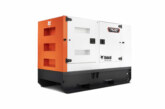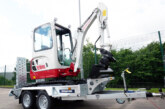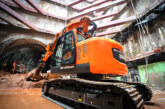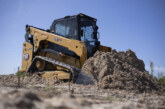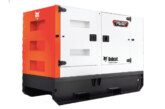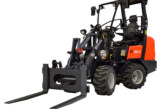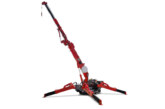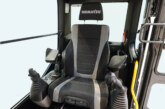Potain’s MCT 385 tower crane has undergone a comprehensive series of improvements, boosting freestanding height and increasing the load curve along the jib, as well as extending the offering with the addition of a new 16 t capacity option.
Now renamed the MCT 385A, it is set to extend its appeal even further across its core markets: Asia, Latin America, Russia, the Middle East, Africa and Australia and New Zealand.
As the first topless crane to be produced from the Potain factory in Zhangjiagang, China, the 20 t capacity MCT 385, was an immediate hit when it launched in 2012. A 14 t capacity model followed later, and was awarded ‘Tower Crane of the Year’ at bauma CTT Russia in 2019.
“Customers have great trust in the Potain MCT 385 and it’s delivered reliable performance on projects all over the world. The new models have inherited all of that core DNA, ensuring the quality continues from design to production,” said Wang Lei, senior vice president of Manitowoc emerging markets. “Our factory is one of the few crane manufacturing plants in China to be certified in line with the ISO 9001 quality assurance standard, and by adopting the FEM1.001 standard for design and development, our topless cranes are built to help users gain a competitive advantage and ensure their confidence in Manitowoc remains strong.”
More choice for owners
Now updated, enhanced and renamed, this proven performer is available in two configurations: the new MCT 385A L20 or MCT 385A L16. Thanks to a jib that has benefitted from a new design and extra reinforcement, the MCT 385A L20 boasts an even greater tip load than its predecessor. At 75 m, the capacity is now 3.4 t – a huge proportional gain on the previous figure of 2.7 t. The new L16 model offers capacities of 12.4 t at 30 m, or 3.8 t at the end of its 75 m jib.
Height performance has also been enhanced, with both new models offering a better maximum freestanding height of 68.2 m, compared with the 64.9 m of the original MCT 385, or the 65.3 m of the MCT 385 L14. The original, compact, high-performance 2 m cross-section mast has been retained, however, providing compatibility with the 3.33 m or 5 m mast inserts that enable height under hook to be adjusted in 1.66 m increments.
Such flexible design guarantees ongoing appeal for fleet owners as well as adaptability for use in a variety of congested urban projects that are the natural habitat of the MCT 385. Three counter-jib options, ranging from 14 m – 22 m in length with counterweight blocks of 4.85 t and/or 3.15 t, support this suitability, along with the other well-known performance advantages of Potain’s topless cranes.
Configure it your way
Each model offers a convenient choice of frequency-controlled hoisting and trolley mechanisms, delivering continuously variable speeds to make the handling and positioning of every pick as precise and convenient as possible. For maximum productivity, a customer could select the 150/180 HPL 50 GH hoist option on the new L20. The 150 HPL 50 GH and 180 HPL 50 GH winches are the same physical model, however when power comes from a 400 V 50 Hz supply, the winch is the 150 HPL version; and for markets where the power supply is 480 V 60 Hz, the winch delivers the performance characteristics of the 180 HPL. When operating as a 180 HPL winch, the crane can raise loads of 2.5 t at up to 150.5 m/min. When operating as the 150 HPL, 2.5 t can be lifted at up to 144 m/min.
The L16 variant’s top-performing hoist is the 100 LVF 40, which can lift 8 t at 44.5 m/min, using either 400 V 50 Hz or 480 V 60 Hz power supplies. Servicing these mechanisms is straightforward too, as they are conveniently located for mechanics to reach.
Like all Potain cranes, the MCT 385A offers a high level of convenience in terms of transportation to or from the jobsite. The ability to pre-assemble certain parts of the crane before they are loaded onto trucks (just 10 standard truckloads or containers are typically required for transport) reduces on-site build time, coupled with the simple and rapid assembly enabled by an abundance of slinging points and its light weight. The assembly process can also be adapted to suit individual preference too – for example, the spacious and comfortable air-conditioned cab can either be added to the towerhead sub-assembly at ground level or at height.


